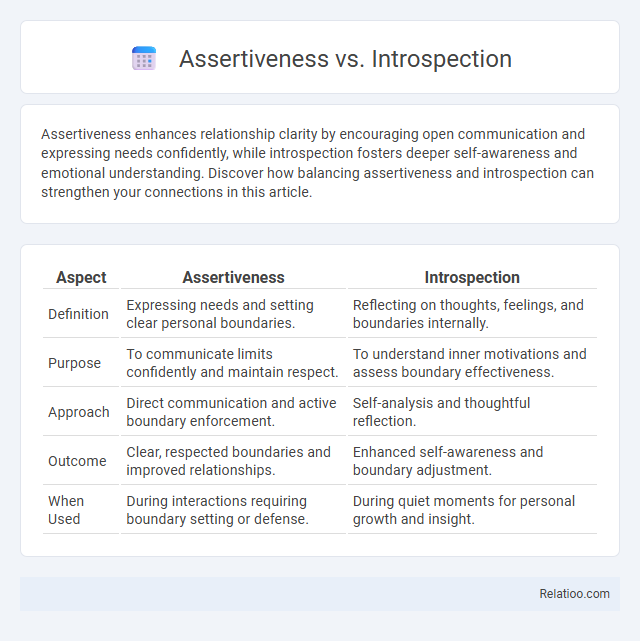Assertiveness enhances relationship clarity by encouraging open communication and expressing needs confidently, while introspection fosters deeper self-awareness and emotional understanding. Discover how balancing assertiveness and introspection can strengthen your connections in this article.
Table of Comparison
| Aspect | Assertiveness | Introspection |
|---|---|---|
| Definition | Expressing needs and setting clear personal boundaries. | Reflecting on thoughts, feelings, and boundaries internally. |
| Purpose | To communicate limits confidently and maintain respect. | To understand inner motivations and assess boundary effectiveness. |
| Approach | Direct communication and active boundary enforcement. | Self-analysis and thoughtful reflection. |
| Outcome | Clear, respected boundaries and improved relationships. | Enhanced self-awareness and boundary adjustment. |
| When Used | During interactions requiring boundary setting or defense. | During quiet moments for personal growth and insight. |
Understanding Assertiveness: Key Traits and Benefits
Assertiveness involves confidently expressing your thoughts and needs while respecting others, which enhances clear communication and builds stronger relationships. Key traits include self-assurance, directness, and the ability to set boundaries without aggression or passivity. Developing assertiveness benefits your personal and professional life by promoting mutual respect, reducing stress, and improving decision-making skills.
The Power of Introspection: Self-Reflection Explained
Introspection empowers you to deeply analyze your thoughts, emotions, and behaviors, fostering personal growth and emotional intelligence. Unlike assertiveness, which emphasizes expressing your needs confidently, introspection prioritizes self-awareness by critically evaluating your internal experiences. Embracing the power of introspection enhances your decision-making and strengthens your ability to understand and regulate your responses effectively.
Assertiveness vs Introspection: Core Differences
Assertiveness involves confidently expressing one's thoughts, feelings, and needs while respecting others, emphasizing outward communication and self-advocacy. Introspection centers on inward reflection, self-examination, and understanding personal emotions and motivations, prioritizing internal awareness over external expression. The core difference lies in assertiveness driving external interactions and proactive behavior, whereas introspection focuses on internal analysis and self-discovery.
Psychological Foundations of Assertiveness and Introspection
Assertiveness is grounded in psychological theories related to self-efficacy and boundary setting, empowering you to express needs and opinions confidently without infringing on others. Introspection involves reflective thinking rooted in metacognition and emotional awareness, facilitating deeper understanding of one's motives, feelings, and behaviors. Both assertiveness and introspection contribute to emotional intelligence by integrating external communication skills with internal self-awareness.
When Assertiveness Drives Success
When assertiveness drives success, confident communication empowers individuals to express ideas clearly, negotiate effectively, and lead decisively in high-stakes environments. Balancing assertiveness with introspection enables continuous self-assessment and emotional regulation, fostering resilience and strategic decision-making. Prioritizing assertiveness in leadership roles correlates with increased team motivation, goal achievement, and overall organizational performance.
The Role of Introspection in Personal Growth
Introspection plays a crucial role in personal growth by enabling you to examine your thoughts, emotions, and motivations deeply, fostering self-awareness and emotional intelligence. Unlike assertiveness, which emphasizes expressing your needs and boundaries outwardly, introspection focuses on internal reflection and understanding. This process helps identify areas for improvement and aligns your actions with core values, promoting authentic and sustainable development.
Balancing Assertiveness with Self-Awareness
Balancing assertiveness with self-awareness enhances your interpersonal effectiveness by enabling clear communication while respecting others' perspectives. Assertiveness involves expressing your thoughts and needs confidently, whereas introspection fosters deep understanding of your emotions and motivations. Maintaining this balance prevents dominance or passivity, promoting healthier relationships and personal growth.
Overcoming Common Misconceptions
Overcoming common misconceptions about assertiveness versus introspection requires understanding that assertiveness empowers you to express thoughts confidently without aggression, while introspection involves deep self-reflection to gain clarity and self-awareness. Mistaking introspection for passivity can hinder personal growth, just as confusing assertiveness with aggressiveness can damage relationships. Balancing both skills helps you navigate social interactions effectively and fosters emotional intelligence.
Practical Strategies: Developing Both Skills
Balancing assertiveness and introspection enhances personal growth and decision-making effectiveness by fostering clear communication while encouraging self-awareness. Practical strategies include setting clear boundaries to express needs confidently, combined with regular reflective practices such as journaling to understand emotions and motivations better. Developing both skills involves role-playing assertive scenarios and dedicating time for mindfulness exercises, enabling a harmonious integration of external confidence and internal clarity.
Finding Harmony: Integrating Assertiveness and Introspection
Finding harmony between assertiveness and introspection involves balancing confident self-expression with thoughtful self-examination to achieve effective communication and personal growth. Assertiveness enables clear articulation of needs and boundaries, while introspection fosters self-awareness and emotional intelligence, creating a foundation for authentic interactions. Integrating these traits enhances decision-making, reduces internal conflict, and promotes healthier relationships by aligning internal values with external actions.

Infographic: Assertiveness vs Introspection
 relatioo.com
relatioo.com